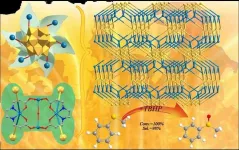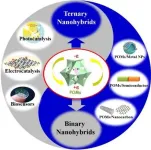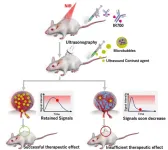(Press-News.org) Research on the trillions of microorganisms that make up a person’s microbiome can lead to medical breakthroughs to treat diseases like inflammatory bowel syndrome and diabetes. According to Alyssa Bader, a Tsimshian Assistant Professor in the Department of Anthropology at McGill University, microbiome samples from Indigenous communities have the potential to further Western medicine, but those same communities often have been excluded from the research process and may miss out on the benefits that result from their contributions to science. There is also a history of this research exploiting and harming Indigenous peoples.
“Microbes associated with Indigenous peoples have been framed as valuable resources to restore lost microbial diversity and treat chronic disease in industrialized populations, but these research directions often do not center the research needs or interests of the Indigenous communities that researchers rely on for microbiome data,” said Bader.
Two perspectives pieces published recently in Nature Microbiology by an international team, including Bader, of Indigenous and non-Indigenous researchers from institutions, including University of Adelaide, University of Wisconsin-Madison, Pennsylvania State University and others, look to rectify the issue.
The articles lay out a framework for ethical microbiome research practices that include Indigenous communities and ensure that these communities reap the benefits from their contributions. The researchers discuss the Indigenous principle of relationality, in which people are interconnected to each other and the world around them, as a framework to guide human microbiome researchers to work in partnership with Indigenous people.
Research with Indigenous communities should be deeply collaborative and uphold Indigenous sovereignty throughout the research process, added Bader. “This includes ensuring Indigenous community partners have a central role in developing research questions, establishing protocols for research consent and data management, and interpreting and communicating results,” she said.
Research on the trillions of microorganisms that make up a person’s microbiome can lead to medical breakthroughs to treat diseases like inflammatory bowel syndrome and diabetes. According to Alyssa Bader, a Tsimshian Assistant Professor in the Department of Anthropology at McGill University, microbiome samples from Indigenous communities have the potential to further Western medicine, but those same communities often have been excluded from the research process and may miss out on the benefits that result from their contributions to science. There is also a history of this research exploiting and harming Indigenous peoples.
“Microbes associated with Indigenous peoples have been framed as valuable resources to restore lost microbial diversity and treat chronic disease in industrialized populations, but these research directions often do not center the research needs or interests of the Indigenous communities that researchers rely on for microbiome data,” said Bader.
Two perspectives pieces published recently in Nature Microbiology by an international team, including Bader, of Indigenous and non-Indigenous researchers from institutions, including University of Adelaide, University of Wisconsin-Madison, Pennsylvania State University and others, look to rectify the issue.
The articles lay out a framework for ethical microbiome research practices that include Indigenous communities and ensure that these communities reap the benefits from their contributions. The researchers discuss the Indigenous principle of relationality, in which people are interconnected to each other and the world around them, as a framework to guide human microbiome researchers to work in partnership with Indigenous people.
Research with Indigenous communities should be deeply collaborative and uphold Indigenous sovereignty throughout the research process, added Bader. “This includes ensuring Indigenous community partners have a central role in developing research questions, establishing protocols for research consent and data management, and interpreting and communicating results,” she said.
A relational framework for microbiome research with Indigenous communities by Alyssa C. Bader et al., and Microbiome ownership for Indigenous peoples by Matilda Handsley-Davis et al., were published in Nature Microbiology.
END
A relational framework for microbiome research that includes Indigenous communities
Research and collection of microbiome samples from Indigenous communities has a history of exploiting and harming Indigenous peoples
2023-10-27
ELSE PRESS RELEASES FROM THIS DATE:
City of Hope part of successful international Phase 3 clinical trial evaluating sotorasib medication combination for patients with metastatic colorectal cancer
2023-10-27
LOS ANGELES — An international Phase 3 clinical trial found that metastatic colorectal cancer patients with a rare genetic tumor mutation called KRAS G12C experienced superior progression-free survival rates compared to standard of care when offered a combination treatment of KRAS inhibitor sotorasib and monoclonal antibody panitumumab. City of Hope, one of the largest cancer research and treatment organizations in the United States, was a participating site and a City of Hope researcher is the lead author of the The New England Journal of Medicine study published this week.
Standard ...
Team synthesizes a new polyoxometalate-based metal-organic complex
2023-10-27
A research team has synthesized a new polyoxometalate-based metal-organic complex that they then tested as a catalyst for the oxidation reactions of various sulfides. They found that the complex possesses excellent catalytic performance, good reusability, and structural stability.
The team’s work is published in the journal Polyoxometalates on October 19, 2023.
Scientists in many fields have explored the selective oxidation of sulfides to sulfoxides. Sulfoxides are organic compounds that contain sulfur and oxygen. These sulfoxides are high value-added chemicals in pharmaceuticals, agrochemistry, ...
The sunscreen paradox: McGill University researchers warn of ‘false sense of security’
2023-10-27
Sunscreen usage is climbing, but so are melanoma and skin cancer rates: this, researchers say, is the sunscreen paradox.
“The problem is that people use sunscreen as a ‘permission slip’ to tan,” said Dr. Ivan Litvinov, an Associate Professor in the Department of Medicine and Chair of the Dermatology Division at McGill University and co-author with Dr. Sandra Peláez, Dr. Richie Jeremian and Dr. Pingxing Xie of two recent studies that explore the sunscreen paradox.
“People think they are protected from skin cancer ...
Hybrid nanomaterials promise a sustainability boost across multiple industries
2023-10-27
Polyoxometalate (POM)-based nanohybrids potentially offer a step-change in sustainability across a wide variety of industries, but research into the substances is in its infancy. A group of researchers has produced a comprehensive review of the sector’s progress and challenges yet to be overcome.
A new class of nanoscale hybrid materials has the potential to improve sustainability across energy systems, transport, biosensors, water purification and even 3D printing, but the field is still very young. A group of researchers has produced a detailed overview ...
Pinktober brings attention to the TMIST international breast cancer screening trial as a new site opens in Thailand
2023-10-27
A clinical trial led by the ECOG-ACRIN Cancer Research Group (ECOG-ACRIN) demonstrates how diversity among study participants is vital for reducing outcomes disparities. Among the vast group of women participating in the TMIST breast cancer screening trial--nearly 93,000 so far--21% self-identify as Black or African American. This diversity offers hope that once the trial reaches its enrollment goal of nearly 129,000 women, its results can better inform and tailor future breast cancer screening for all women.
The TMIST breast cancer study is investigating whether screening for breast cancer ...
Find-and-replace genome editing with CRISPR: A promising therapeutic Strategy
2023-10-27
Severe Combined Immunodeficiencies (SCIDs) are a group of debilitating primary immunodeficiency disorders, primarily caused by genetic mutations that disrupt T-cell development. SCID can also affect B-cell and natural killer cell function and counts. Left untreated, SCID proves fatal within the first year of life. The conventional treatment for SCID patients involves allogeneic hematopoietic stem cell transplantation (HSCT), but the challenges of finding compatible donors and potential complications like graft-versus-host disease (GVHD) pose significant hurdles ...
Long COVID most prevalent in the most seriously ill
2023-10-27
A collaborative study involving researchers from Karolinska Institutet has charted the prevalence of severe physical symptom burden amongst Scandinavians for up to two years after a SARS-CoV-2 infection. Most affected were people who had a severe COVID-19 infection, while the researchers found no elevated prevalence of long COVID in those who had never been bedridden. The study is published in The Lancet Regional Health – Europe.
By mid-October 2023, over 771 million cases of COVID-19 had been reported to the World Health Organization (WHO). An estimated 10 to 20 per cent of the affected have persistent symptoms.
Close to 65,000 participants
In the present ...
Scientists build on artificial intelligence to create next-generation gastric acid treatment
2023-10-27
Researchers at Nagoya University in Japan created and improved artificial intelligence (AI) designs to synthesize a candidate compound for a new gastric acid inhibitor with a better binding affinity than existing drugs. Their findings, published in Communications Biology, suggest a new way to work in tandem with AI to develop pharmaceuticals.
Stomach acid is a crucial component of food digestion. However, when the balance of gastric mucosal secretion is disturbed, stomach acid can cause discomfort and, in severe cases, conditions such as gastric ulcers and reflux esophagitis. Therefore, many people turn to gastric acid suppressants, most of which target the gastric ...
Is it possible for random bit generator to reach a rate of Peta bits/s?
2023-10-27
The optical frequency comb is an important tool in modern physics research and applications. In 2005, Theodor W. Hänsch and John L. Hall were awarded the Nobel Prize in Physics for their pioneering work on optical frequency comb technology. This sparked a great interest among researchers in the field, leading to a series of studies on optical frequency combs. Advanced nanophotonic technology has enabled integrated microresonators with ultrahigh Q factors and chip-scale microcombs. Among various comb dynamic states, a chaotic comb has high nonlinearity. In a chaotic comb, each comb tooth exhibits a chaotic dynamic ...
A new NIR-PIT biomarker paves the way for targeted cancer treatments
2023-10-27
Researchers at Nagoya University in Japan and their collaborators have used a biomarker based on microbubbles to evaluate the success of near-infrared photoimmunotherapy (NIR-PIT) treatment. Using ultrasound to track the microbubbles, they were able to identify areas where cancer therapy had not been fully applied. Their findings suggest ways to improve NIR-PIT and make it a viable alternative treatment for various types of cancer.
NIR-PIT is an innovative cancer treatment that combines the use of antibodies and near-infrared light to ...
LAST 30 PRESS RELEASES:
Scientists reveal our best- and worst-case scenarios for a warming Antarctica
Cleaner fish show intelligence typical of mammals
AABNet and partners launch landmark guide on the conservation of African livestock genetic resources and sustainable breeding strategies
Produce hydrogen and oxygen simultaneously from a single atom! Achieve carbon neutrality with an 'All-in-one' single-atom water electrolysis catalyst
Sleep loss linked to higher atrial fibrillation risk in working-age adults
Visible light-driven deracemization of α-aryl ketones synergistically catalyzed by thiophenols and chiral phosphoric acid
Most AI bots lack basic safety disclosures, study finds
How competitive gaming on discord fosters social connections
CU Anschutz School of Medicine receives best ranking in NIH funding in 20 years
Mayo Clinic opens patient information office in Cayman Islands
Phonon lasers unlock ultrabroadband acoustic frequency combs
Babies with an increased likelihood of autism may struggle to settle into deep, restorative sleep, according to a new study from the University of East Anglia.
National Reactor Innovation Center opens Molten Salt Thermophysical Examination Capability at INL
International Progressive MS Alliance awards €6.9 million to three studies researching therapies to address common symptoms of progressive MS
Can your soil’s color predict its health?
Biochar nanomaterials could transform medicine, energy, and climate solutions
Turning waste into power: scientists convert discarded phone batteries and industrial lignin into high-performance sodium battery materials
PhD student maps mysterious upper atmosphere of Uranus for the first time
Idaho National Laboratory to accelerate nuclear energy deployment with NVIDIA AI through the Genesis Mission
Blood test could help guide treatment decisions in germ cell tumors
New ‘scimitar-crested’ Spinosaurus species discovered in the central Sahara
“Cyborg” pancreatic organoids can monitor the maturation of islet cells
Technique to extract concepts from AI models can help steer and monitor model outputs
Study clarifies the cancer genome in domestic cats
Crested Spinosaurus fossil was aquatic, but lived 1,000 kilometers from the Tethys Sea
MULTI-evolve: Rapid evolution of complex multi-mutant proteins
A new method to steer AI output uncovers vulnerabilities and potential improvements
Why some objects in space look like snowmen
Flickering glacial climate may have shaped early human evolution
First AHA/ACC acute pulmonary embolism guideline: prompt diagnosis and treatment are key
[Press-News.org] A relational framework for microbiome research that includes Indigenous communitiesResearch and collection of microbiome samples from Indigenous communities has a history of exploiting and harming Indigenous peoples






